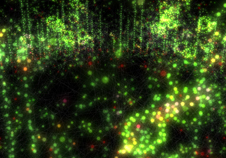Getting inside the control mechanisms of complex systems

Northeastern University researchers are offering a fascinating glimpse into how greater control of complex systems, such as cellular networks and social media, can be achieved by merging the tools of network science and control theory.
Albert-László Barabási and Yang-Yu Liu coauthored a paper on the research findings, featured as the cover story in the May 12 issue of the journal Nature. Barabási, a world-renowned network scientist, is a distinguished professor in the Departments of Physics and Biology and the College of Computer and Information Science, and is the founding director of Northeastern’s Center for Complex Network Research. Liu is a postdoctoral research associate in Barabasi’s lab.
The researchers said this approach can lead to major strides in understanding complex engineering and biological systems. For example, controlling the neural and metabolic pathways in living organisms could lead to health-care breakthroughs in drug discovery and disease treatments.
“Most large complex networks have been created for some practical purpose: metabolic networks to process the food we eat, the Internet to transfer information, organizational networks to achieve the goals of an organization,” said Barabási. “The tools developed in this paper offer the possibility to better understand how to control these systems. This could potentially generate more efficient metabolic pathways, with applications in developing cures to metabolic diseases, to offering new insights into the design of better organizations.”
Barabási and Liu collaborated with MIT researcher Jean-Jacques Slotine on the paper.
The researchers note that control theory already offers mathematical tools for steering engineered and natural systems — such as synchronized manufacturing processes, cars, robots and electrical circuits — toward a desired state.
However, they said a framework is lacking to take charge of complex, self-organized systems — such as cellular and social networks. To meet this challenge, they combined the principles of control theory with their innovative network science research to develop an algorithm that can assess the driver nodes, or connection points, within a particular complex network. By doing so, they can determine how many nodes are necessary to control in order to gain control of the system.
The trio was interested in discovering the minimum number of driver nodes needed to control a complex network. They found that denser networks with more connections — such as online social networks — were easier to control than cellular networks. They also found that sparse networks, like many biological and communication networks, are the hardest to control.
Liu said this work represents a fundamental contribution to both control theory and network science research.
“This work was not possible 10 years ago, because at that time we didn’t know how to categorize these complex networks. We didn’t have the data,” Liu said. “But today, we have the data available for empirical studies on many large-scale networks.”
View selected publications of Albert-László Barabási in IRis, Northeastern’s digital archive.





